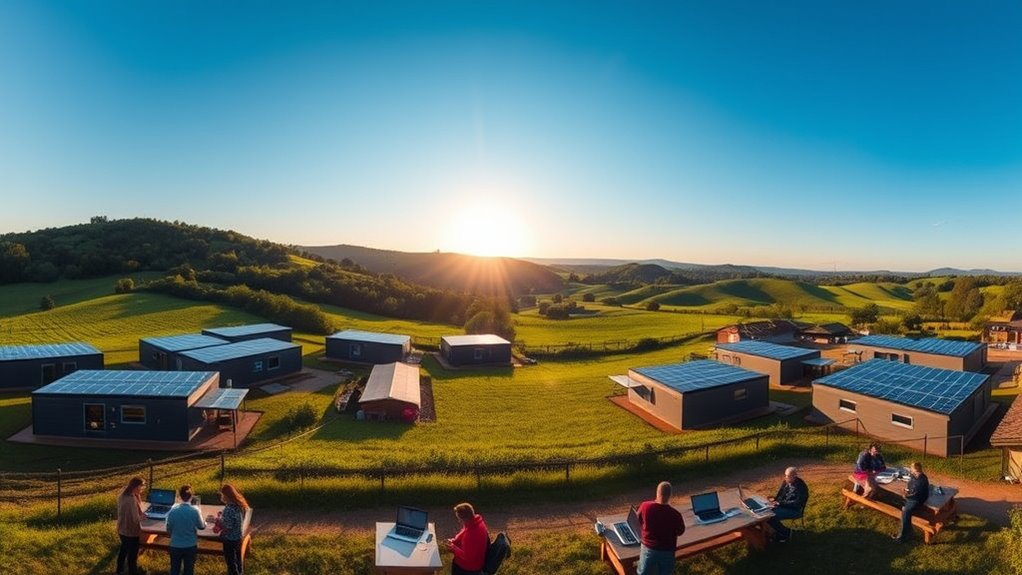A small-town incubator can spark a rural tech boom by combining broadband expansion with agricultural innovations. Improved internet connects local entrepreneurs globally, helping them access funding, mentorship, and markets. Using technology like IoT sensors, drones, and data analytics, these startups solve farming challenges and create scalable solutions. This synergy attracts talent and investment, turning rural areas into innovation hubs. Keep exploring to discover how these communities are shaping the future of global startups.
Key Takeaways
- Rural incubators leverage broadband access to connect local entrepreneurs with global markets, investors, and mentors.
- Agricultural innovation drives startup development by offering scalable solutions like precision farming and IoT technologies.
- Broadband expansion enables rural entrepreneurs to participate in online education, remote work, and digital collaboration.
- Local incubators provide funding, training, and networking resources that help rural startups grow and attract international attention.
- The combination of rural innovation and connectivity transforms small towns into global hubs for technology and agricultural solutions.

Despite their remote locations, rural areas are experiencing a technological resurgence driven by innovative investments and community-driven initiatives. You might think these regions lag behind urban centers when it comes to technology, but recent developments tell a different story. Thanks to a focus on agricultural innovation and broadband expansion, rural communities are transforming their local economies and becoming hubs for startup activity. This shift isn’t just about improving daily life; it’s about creating opportunities for entrepreneurs like you to develop solutions that can scale globally.
Broadband expansion plays a pivotal role here. When high-speed internet becomes accessible, it opens doors to online education, remote work, and digital collaboration—tools essential for modern startups. You can now connect with mentors, investors, and customers worldwide without leaving your community. This connectivity fuels the growth of local incubators, which support emerging businesses with resources, mentorship, and networking opportunities. As a result, rural entrepreneurs are no longer isolated; they’re integrated into broader markets and innovation ecosystems.
Agricultural innovation is also a key driver of this tech boom. You’re seeing new technologies like precision farming, IoT sensors, and data analytics being adopted by farmers and agritech startups. These innovations boost productivity, reduce costs, and promote sustainable practices. If you’re involved in farming or agribusiness, these advancements mean you can optimize your operations and compete on a global scale. The region’s focus on agricultural innovation attracts investments and talent, further strengthening the local startup scene. Additionally, understanding technology adoption can help communities and entrepreneurs maximize the benefits of these advancements.
The synergy between broadband expansion and agricultural innovation creates a fertile ground for startups. You might find yourself developing an app that helps farmers monitor crop health or designing a drone system for pest control. These ideas often originate from the local community’s needs, making them highly relevant and scalable. The small-town incubators serve as launching pads, providing access to funding, training, and networks that were previously out of reach. With these resources, you’re empowered to turn innovative ideas into viable products and attract attention from investors nationally and internationally.
This environment encourages a culture of entrepreneurship. You’re no longer just a farmer or a small-town resident—you’re part of a growing ecosystem that values ingenuity and resilience. The combination of improved digital infrastructure and a focus on agricultural innovation means your startup can thrive. The rural tech boom is proof that even small communities with limited traditional resources can become epicenters of global innovation. It’s an exciting time where your ideas, supported by expanded broadband and innovative farming solutions, have the potential to make a significant impact well beyond your community.
Frequently Asked Questions
What Specific Technologies Drove the Startups’ Success?
You see, the startups’ success hinges on key technologies like agricultural automation and renewable energy. These innovations streamline farming processes, increase efficiency, and reduce costs, making rural areas more competitive. Renewable energy solutions power their operations sustainably, cutting reliance on external sources. By leveraging these technologies, you can transform small-town ventures into global players, demonstrating that smart tech choices are vital for rural startup growth and long-term success.
How Did Local Residents Benefit From the Tech Boom?
Imagine reaping the rewards of a thriving tech scene right in your backyard. You benefit from increased community engagement, which fosters a stronger local spirit, and skill development opportunities that boost your career prospects. The tech boom creates jobs and attracts new businesses, enriching the economy. You also enjoy improved infrastructure and services, all while empowering yourself with new skills and connections that open doors to a brighter future.
What Challenges Did the Incubator Face Initially?
You face challenges like building community engagement and developing infrastructure to support startups. Initially, convincing residents of the incubator’s value proved tough, and securing reliable internet and office spaces required significant effort. You work to foster local support and upgrade facilities, understanding these steps are vital for growth. Overcoming these hurdles helps create a thriving environment where innovations can flourish, benefiting both the community and the startups involved.
Are There Plans to Replicate This Model Elsewhere?
Imagine you’re exploring a successful rural incubator’s expansion plans. They’re focusing on scaling strategies and regional collaboration, aiming to replicate their model in other areas. The goal is to foster local innovation hubs that connect startups to resources and markets. While specific plans are in development, the focus remains on adapting their proven approach to different regions, ensuring sustainable growth and community engagement across diverse rural landscapes.
How Is the Incubator Funded and Sustained Long-Term?
You might wonder how the incubator stays afloat long-term. It relies on diverse funding strategies, including government grants, private investments, and community partnerships. These sources guarantee sustainable growth by providing consistent support and resources. You’ll find that this mix of funding helps the incubator adapt over time, fostering innovation and success for startups. Maintaining this balance is key to its ongoing stability and ability to nurture new ideas.
Conclusion
As you see, this rural tech boom is transforming small towns into innovation hubs. Imagine a place where, in just five years, startup growth skyrocketed by 300%, turning quiet communities into bustling centers of creativity. You might not expect it, but these rural incubators are proving that great ideas don’t need big city streets. So, next time you think of tech, picture these small towns leading the charge—showing that innovation can come from anywhere.








